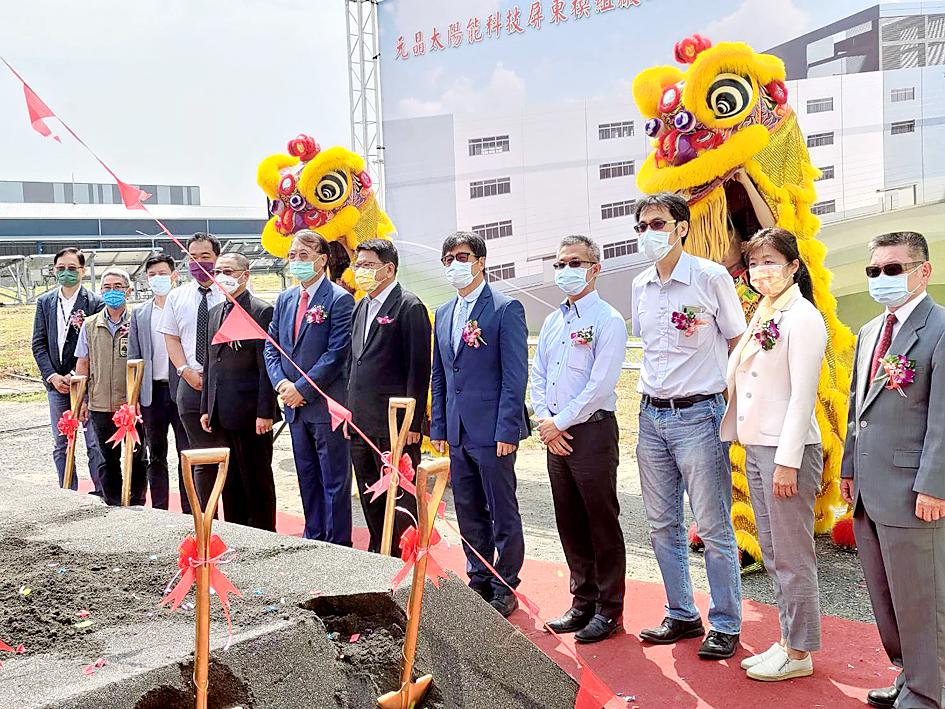TSEC Corp (元晶太陽能) yesterday said it is investing NT$1 billion (US$35.75 million) to expand large-sized solar module capacity and a logistic facility at its plant in Pingtung City in expectation of rising demand for clean energy next year.
The investment would bring TSEC’s annual solar module capacity to 1.5 gigawatts, a 50 percent increase from the current level, the company said in a statement.
The new production line would be completed in September next year and enter volume production in the fourth quarter of the same year, the firm said.

Photo courtesy of TSEC Corp
“Large solar cells and modules will help satisfy urgent demand from domestic solar power developers. The modules will also help improve land-use efficiency, as local solar power developers are facing challenges to secure land,” TSEC spokesman Henry Chiang (江郅豪) said.
TSEC earlier this year spent NT$750 million building a new production line in Hsinchu County’s Hukou Township (湖口) that would produce large and high-efficiency 525 watt and 700 watt solar cells, rather than the standard solar cells that are between 350 and 400 watts.
TSEC vice president for marketing William Liao (廖偉然) yesterday gave an optimistic outlook about solar demand, saying that cutting carbon emissions has become a major global focus this year, with the US and China targeting carbon neutrality by 2030 and 2060 respectively.
That will drive demand for solar power in China and the US, Liao said in a statement.
Taiwan has gained an advantage over its rivals and secured a bigger share of the US’ 20-gigawatt solar market, as the administration of US President Joe Biden has banned the use of solar products made in China’s Xinjiang region and curbed imports of solar products from Southeast Asian countries amid lawsuits over tariff evasion, he said.
In Taiwan, TSEC expects solar panel installation to soar 50 percent to 3 gigawatts next year, compared with 2 gigawatts this year, Liao said, adding that a surge in raw material costs would gradually ease next year.
Separately, silicon wafer supplier Sino-American Silicon Products Inc (中美晶) yesterday said that solar revenue jumped 23.44 percent month-on-month, or 97.37 percent annually, to NT$840 million last month.
That helped boost the firm’s consolidated revenue last month to NT$6.25 billion, up 7.34 percent from a month earlier, or up 12.2 percent from a year earlier.
In the third quarter, the company’s revenue inched up 1.97 percent sequentially, or 13.93 percent annually, to NT$17.52 billion.
Solar revenue grew 7.95 percent quarterly and 55.65 percent annually to NT$2.14 billion last quarter, the company said.
About 90 percent of the company’s revenue came from its silicon wafer manufacturing arm, GlobalWafers Co (環球晶圓), which posted NT$15.36 billion in revenue last quarter.

Real estate agent and property developer JSL Construction & Development Co (愛山林) led the average compensation rankings among companies listed on the Taiwan Stock Exchange (TWSE) last year, while contract chipmaker Taiwan Semiconductor Manufacturing Co (TSMC, 台積電) finished 14th. JSL Construction paid its employees total average compensation of NT$4.78 million (US$159,701), down 13.5 percent from a year earlier, but still ahead of the most profitable listed tech giants, including TSMC, TWSE data showed. Last year, the average compensation (which includes salary, overtime, bonuses and allowances) paid by TSMC rose 21.6 percent to reach about NT$3.33 million, lifting its ranking by 10 notches

Popular vape brands such as Geek Bar might get more expensive in the US — if you can find them at all. Shipments of vapes from China to the US ground to a near halt last month from a year ago, official data showed, hit by US President Donald Trump’s tariffs and a crackdown on unauthorized e-cigarettes in the world’s biggest market for smoking alternatives. That includes Geek Bar, a brand of flavored vapes that is not authorized to sell in the US, but which had been widely available due to porous import controls. One retailer, who asked not to be named, because

SEASONAL WEAKNESS: The combined revenue of the top 10 foundries fell 5.4%, but rush orders and China’s subsidies partially offset slowing demand Taiwan Semiconductor Manufacturing Co (TSMC, 台積電) further solidified its dominance in the global wafer foundry business in the first quarter of this year, remaining far ahead of its closest rival, Samsung Electronics Co, TrendForce Corp (集邦科技) said yesterday. TSMC posted US$25.52 billion in sales in the January-to-March period, down 5 percent from the previous quarter, but its market share rose from 67.1 percent the previous quarter to 67.6 percent, TrendForce said in a report. While smartphone-related wafer shipments declined in the first quarter due to seasonal factors, solid demand for artificial intelligence (AI) and high-performance computing (HPC) devices and urgent TV-related orders

MINERAL DIPLOMACY: The Chinese commerce ministry said it approved applications for the export of rare earths in a move that could help ease US-China trade tensions Chinese Vice Premier He Lifeng (何立峰) is today to meet a US delegation for talks in the UK, Beijing announced on Saturday amid a fragile truce in the trade dispute between the two powers. He is to visit the UK from yesterday to Friday at the invitation of the British government, the Chinese Ministry of Foreign Affairs said in a statement. He and US representatives are to cochair the first meeting of the US-China economic and trade consultation mechanism, it said. US President Donald Trump on Friday announced that a new round of trade talks with China would start in London beginning today,